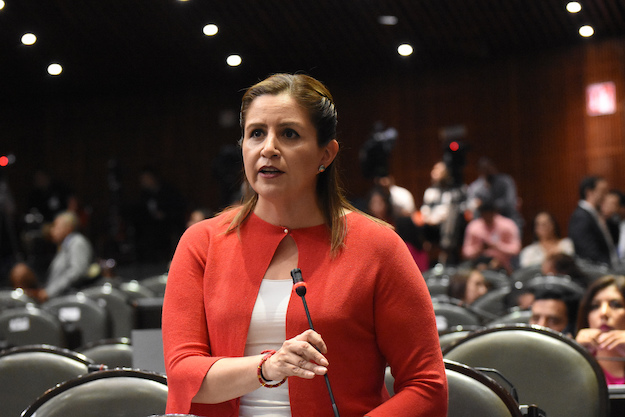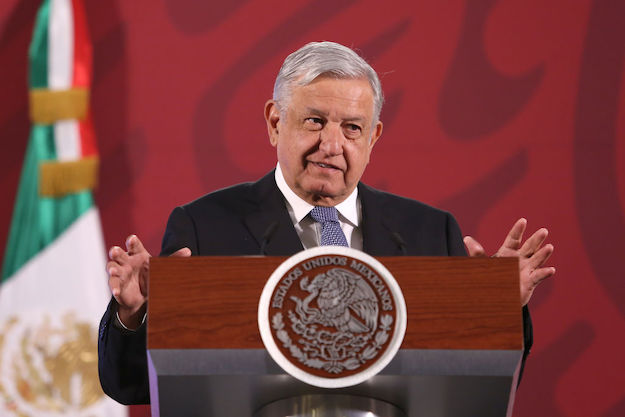Has a sudden spirit of comity taken over Mexico’s Congress?
The constitutional change needed for the creation of President Andrés Manuel López Obrador’s new National Guard generated contentious debate before it was approved earlier this year. But on May 21 the Senate unanimously passed the secondary legislation designed to regulate the creation and deployment of the force itself.
In contrast to the constitutional reform, Morena and its allies had the simple majorities they needed to pass the legislation on their own. Instead, they agreed to work with the opposition on a set of consensus bills, which are now in the lower house and expected to pass before the end of the week.
To understand how Congress came to agreement on López Obrador’s marquee security proposal, AQ spoke with Martha Tagle, a representative from the Citizens’ Movement party in the Chamber of Deputies and a key voice throughout debate over the National Guard. For Tagle, the controversial proposal, while still not perfect, has benefited from negotiation and compromise in Congress. This interview has been translated from Spanish, and edited for clarity and length.
AQ: Morena and its allies in the Senate negotiated with the opposition on these laws, even though they didn’t have to. Why is that?
Martha Tagle: Morena needed votes in the Senate for its education reform, which, because it was a constitutional change, needed a qualified majority. It was stuck on the first vote, but passed on the second. Why? Because, among other things, several of the opposition parties and Morena came to an agreement. We’ll give our votes for the education reform, with some small changes, so long as you put the National Guard up for discussion and input from all the parties during this legislative session. It wasn’t all just good will, but the conditions for a deal were there and that’s why we now have these consensus bills. Political agreements like that are worthwhile, so long as they’re done in order to improve public policy.
AQ: When AMLO won the presidency with strong majorities in both houses, there was an idea that he wouldn’t face any meaningful opposition. That doesn’t seem to be the case here.
MT: Well, it’s the first time since López Obrador has come into office that we’ve really been able to serve as a counterweight in Congress. Before the debate on the National Guard, particularly here in the Chamber, it had been a “we’re going forward and nobody can stop us” attitude, of not taking the opposition into account.
The changes to the National Guard prove that the opposition can build and make improvements to his program. The president and his team’s original proposal is totally different from what we have before us today, and for the better. It’s not about trying to move backwards. Many people in the government still believe that opposition is about obstruction or wanting to be against the president’s proposals. It’s not. The opposition can also help build.
AQ: What if five years from now, when the military is supposed to have returned to barracks, the security situation in Mexico hasn’t improved, or hasn’t improved enough. How can you ensure that the military really is taken off the streets, and that the National Guard represents more than just a nominal change?
MT: That’s why it was so important that the original incorporation of trained military and naval police into the National Guard be a temporary arrangement – the constitutional reform guarantees that, and in the time period we’re talking about we have to create conditions for the military to get off the streets. That’s where the secondary laws come in.
The original plan was a National Guard that could practically get involved in everything – from dealing with a robbery to combatting organized crime, and without needing to first coordinate with state governments. These laws seek to regulate that.
The law regulating use of force to me is the most important when it comes to the military. The military is trained to use lethal force. The military is trained either to repress, or to not get involved. But there are many different ways to view the use of force, and in addition to defining them clearly, there needs to be a very serious capacity-building program so that the security forces understand when lethal force is necessary and when it isn’t.
AQ: Prior to becoming president, AMLO has at times seemed to favor a security strategy that would quickly return the military to barracks. What changed?
MT: He began to develop a deeper relationship with the armed forces, especially during last year’s transition. I think the military convinced him that the security situation in the country was so corrupt, so perverted, that he couldn’t trust anyone else.
Military leaders have spoken publicly of how civilian forces have failed Mexico. They seem to ignore the fact that, while it is true that there is a lot of corruption in the police forces, they’ve also been abandoned. They are often poorly armed, poorly paid, given very little training and overworked. And still the federal police had started, little by little, the work of becoming a truly professional force. But I think the military painted the picture that AMLO couldn’t trust any governor or any state or municipal force, and that it had to be the military because the military is loyal, they’ve been trained to be loyal.
The military seems to have sold this to López Obrador well enough that he’s not only put them in charge of security, but also other projects like the airport at Santa Lucía. For a president who is not accustomed to being contradicted, a military that is accustomed to obeying is probably pretty convincing. It’s those two things together – their depiction of the security panorama and the loyalty that the military offers.
AQ: While the medium- and long-term solutions to security are addressed – police reform, economic opportunity, and the rest – is the National Guard the best short-term option available for dealing with violence?
MT: The National Guard is what we were able to build in the face of an original proposal that was totally and absolutely militarized. We had a choice between deepening a failed strategy on security, going even more fully into a total military confrontation, or working with a National Guard, which is a type of hybrid force.
The National Guard benefitted from having been constructed through consensus, through many voices – not just the opposition, but also experts and specialists who were invited to participate. The Guard is not the solution to all of the country’s security problems, without any doubt. There are so many aspects to deal with, especially at a local level – and here we’ll have to insist, because the president seems to want to resolve everything from the inside out. But in security there are no simple solutions, nor solitary solutions. The National Guard is what we were able to do now, and it can be an important part of the work on security, but it isn’t the solution in itself.
—
Russell is a senior editor and Mexico City correspondent for Americas Quarterly. Follow him on Twitter @BenPaulRussell.









